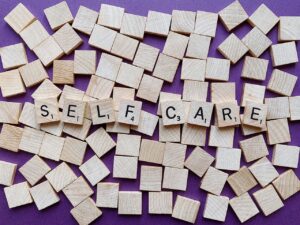The importance of self-care in mental health is what we are going to talk today about. How to prioritize self-care in mental health? Yes, many of us feel stress and anxiety creating chaos in our lives, but that is when we need to think about ourselves and our mental health. Nobody else would do that for us. It is up to us to take care of our own well-being and mental health.

Mental health is just as crucial as physical health, though it’s not always as visible. We need to remember, that if we are taking care of our physical health, we would need to do the same for our mental health. Sadly people tend to forget this.
Why
The thing is you may be wondering, ‘How do I know if I need more self-care?’ The answer is too easy, in my opinion. Look for signs of burnout. These can include things like persistent exhaustion, a cynical attitude towards life. Or could be just a feeling that your daily activities lack meaning. Remember, when you notice these red flags, it is time to slow down, take a step back and focus on self-care.
Now I am going to take you through what mental health really means: it’s about how we think, feel, and act. It influences our emotional resilience, cognitive processing, and social interactions. A solid mental health foundation allows us to handle the ups and downs of life.
For sure, self-care isn’t just bubble baths and scented candles, even if they are really nice and even the idea of them makes us think about relaxation. Right? Anyway, self-care is a set of actions we deliberately take to care for our mental, emotional, and physical health.
Good self-care is a big part of the puzzle – it’s key to improved mood and reduced anxiety. Basically, we could call it our personal line of defense against the psychological stress that life throws at us. This isn’t just about feeling good in the moment. For sure, that is great, but it is not all that this is about. It is also about setting yourself up for long-term health and happiness.

Resilience
Now, resilience doesn’t come out of nowhere. It builds up as we repeatedly choose healthy coping strategies. Self-care provides us with the energy to tackle challenges, pursue our goals, and recover from setbacks.
Keep in mind, that by regularly investing in self-care practices, you are building a mental health toolkit that is ready whenever you need it.
With these ideas in place, we can move on to the next part of the discussion. You are going to find out about practical self-care strategies that can be implemented into the fabric of your daily life.
This is not just about occasional acts of indulgence even it is great sometimes to give yourself something like a well-deserved bubble bath. It’s also about sustainable habits that support long-term mental wellness. I would say it is mainly about sustainable habits for our mental health and well-being.
Self-Care Strategies That Promote Mental Wellness
I am going to take you through some self-care practices that are not only simple but can significantly boost your mental health. This isn’t just about indulging in massages or taking long baths. It is also about sustainable habits that can help you manage stress and maintain emotional balance.
Firstly, let’s chat about everyday actions you can take for self-care. These might include establishing a regular sleep pattern, setting aside time for hobbies, or making room for moments of solitude to reflect and recharge.
Do you want some solitude? CLICK HERE to learn about meditation.
Remember, incorporating mindfulness into your day is not a luxury, it is a necessity for mental clarity and peace. Techniques like meditation, deep-breathing exercises, and journaling can be powerful tools for maintaining mindfulness and managing anxiety.
Don’t underestimate the power of physical activity and a balanced diet in taking care of your mind. Exercise is a proven stress reliever, and the right nutrients can affect your mood and energy levels. It’s not about drastic changes, but rather about finding enjoyable physical activities and making healthier food choices consistently.

Navigating social networks is also essential. Choose something that you like. That could mean spending time with loved ones, participating in group activities, or simply connecting with others through shared interests. However, it’s also important to set boundaries to protect your mental space from negativity or overload.
Now, to transition smoothly into the next section. While these strategies are essential for our well-being, it’s also true that many of us find them hard to implement consistently. If you’re wondering why, the upcoming section will go into the barriers to self-care. There is also practical advice on how to overcome them.
Overcoming Barriers to Self-Care in Today’s Fast-Paced World
Now I am going to acknowledge something we all face: the modern world is full of distractions and constant demands on our time. Self-care sounds great in theory, but when you’re juggling work, family, and other obligations, it’s often the first thing to fall by the wayside.
You are going to find out about common barriers like the feeling that self-care is a luxury. There are also misconceptions that it requires a significant time commitment. It is vital to understand that self-care should not be considered a reward, it is a fundamental piece of the mental health foundation.

Time management
So I am here to help you with time management tips that can seamlessly add self-care into your life. Small, manageable acts, such as a five-minute meditation session or a short walk, can make a significant difference.
Don’t worry too much about carving out large chunks of your day. It’s about finding those small pockets of time that can be transformed into relaxing breaks. Remember, short, consistent practices can lead to long-term benefits.
In my opinion, technology, often viewed as a distraction, can actually be a powerful ally in your self-care journey. Apps that remind you to stand up and move, meditate, or track your mood can help you maintain consistent self-care habits.
Addressing the stigma surrounding mental health is just as important as the practices themselves. If you feel comfortable doing so, share your self-care journey with friends or colleagues. So, remember, by normalizing self-care, we can foster a more supportive environment for everyone’s mental health.

Now, as we tie individual self-care to the broader tapestry of society, let’s look at the collective benefits of widespread self-care practices and consider how transformative they can be, not only for individuals but for communities as well.
The Ripple Effect of Self-Care on Community Mental Health
I am going to walk you through the extraordinary way that your personal self-care routine doesn’t just end with you. It starts a wave of positivity. We all are connected with each other in more ways than we think. When you prioritize your mental well-being, the benefits ripple outward, contributing to the mental health of your community as a whole.
How
So imagine this: by managing stress through self-care, you are less likely to lash out in frustration, making your social circle a more peaceful and positive place.
And who doesn’t want to live in a peaceful and positive place? That is going to include nurturing environments that encourage open discussions about mental health, and that’s just the beginning.
You are going to find out about communities where mental wellness is a collective pursuit. It is a place where each member’s commitment to self-care strengthens the resolve to support one another. Amazing. Right? In my opinion, the power of empathy and mutual care can’t be understated. When people see you practicing self-care, it often encourages them to do the same.
I’ve observed that supportive communities don’t just emerge—they’re built through individual actions. Choose something that resonates with you, like volunteering or joining local mental health initiatives, and you’ve already planted a seed of change.

Promise to yourself
So my question to you today is, what small step towards self-care will you commit to? It’s about making a promise to yourself and, indirectly, to those around you. A lot is happening very quickly in our lives, but taking the time for self-care can be the key to a healthier, more empathic society.
Don’t worry too much about starting big. Choose activities that bring you joy and peace, knowing these personal choices have the power to positively impact others. In the process, you’re not just enhancing your own life, but you’re also contributing to a culture that values and prioritizes mental health.
In wrapping up, I really hope that what you take away from this is a sense of responsibility, not just for your own mental health, but for how it can positively influence the mental health of your community. Together, we can create a world where self-care is not a luxury, but a fundamental aspect of everyday life.
Conclusion
Today we talked about the importance of self-care in mental health. Please remember that we all need to take care of our mental health the same as we do with physical health. Actually, we need to prioritize self-care.
Creating a personalized self-care plan might sound a bit difficult, but it doesn’t have to be. It is easy. So, start by choosing activities that you like. It can be reading, exercising, or spending time in nature. It’s about quality, not quantity.

Do you understand that self-care in mental health is needed for you? What are you doing to get your mind to rest? So what kind of tools, methods, techniques, or tricks you are doing to help your mental health and reduce stress in the process? Any advice or suggestions? Please let us know and write in the comment section below.
Want to learn more about meditation? CLICK HERE to find out.
I like to hear from you, so please leave me a comment below to let me know if this article helped you.
If you want to know more about ways how you can manage stress, please subscribe to this blog, and you will receive a notification, when a new post is published.
If you think this article is helpful, please share it.
Thank you! Have a nice day! Until later
Linda Mo
Founder and owner of How To Reduce Stress Naturally
